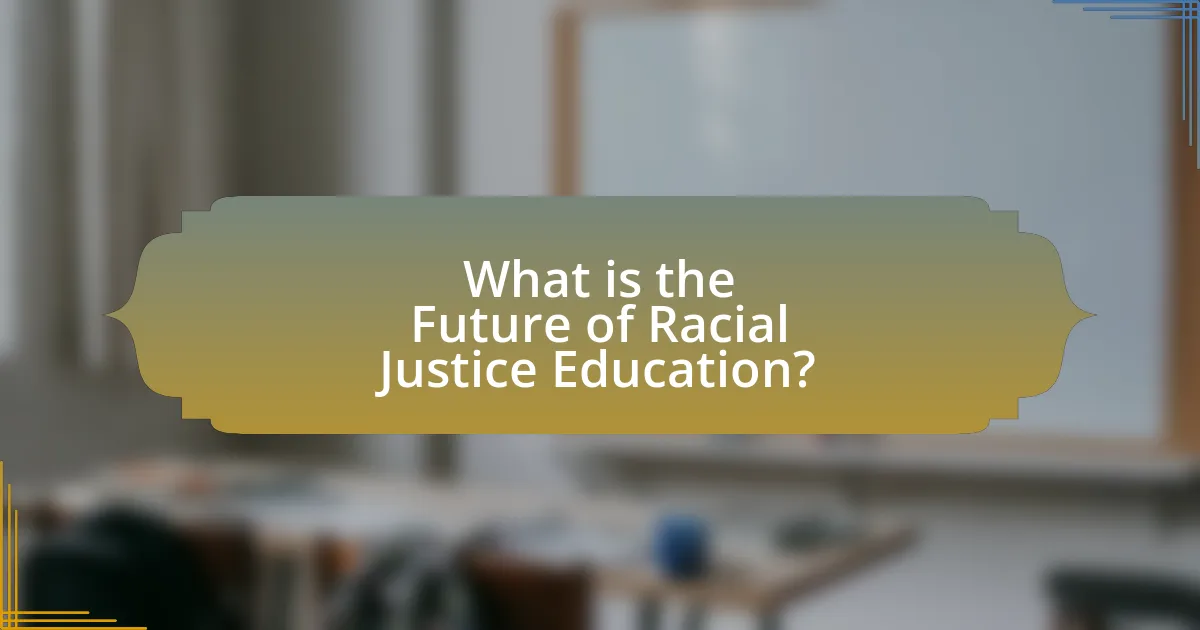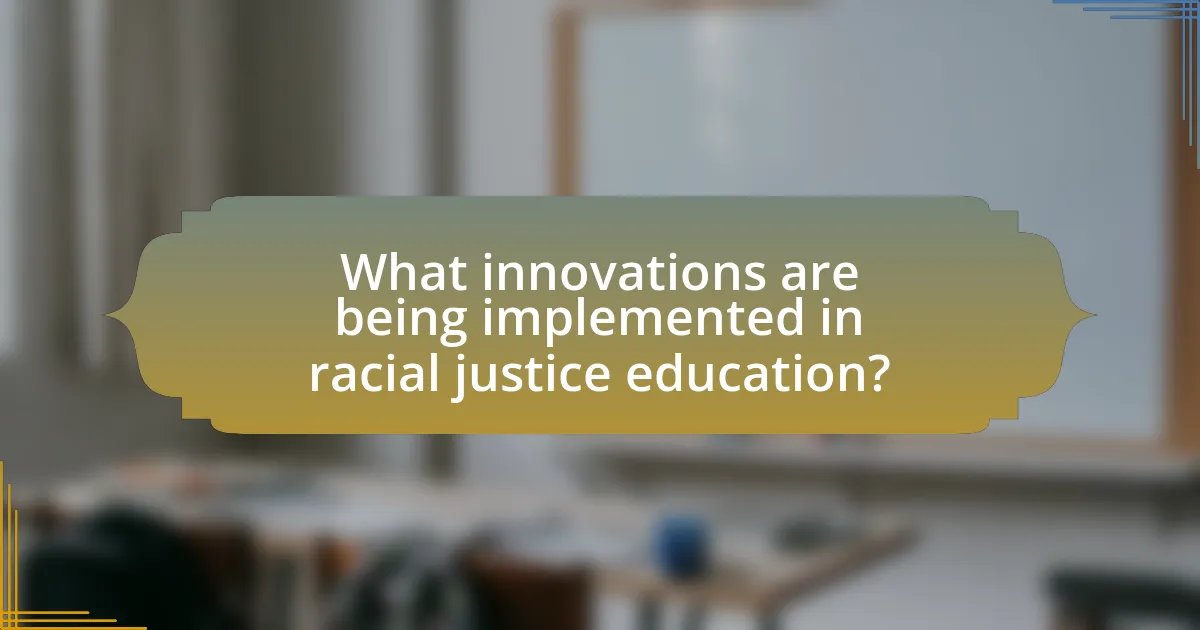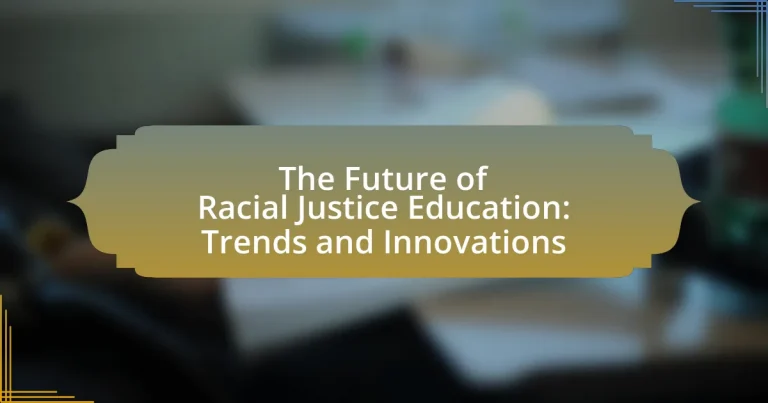The article focuses on the future of racial justice education, emphasizing the integration of anti-racist curricula and the creation of inclusive environments within educational institutions. It highlights the evolution of racial justice education in response to societal changes, historical influences, and the increasing recognition of systemic inequalities. Key trends include the adoption of culturally responsive teaching, the use of technology to enhance learning, and the importance of community partnerships. The article also discusses the role of educators in promoting equity and the various resources available to support effective implementation of racial justice education.

What is the Future of Racial Justice Education?
The future of racial justice education is focused on integrating anti-racist curricula and fostering inclusive environments in educational institutions. This shift is driven by increasing awareness of systemic inequalities and the demand for equitable educational practices. Research indicates that schools implementing culturally relevant pedagogy see improved student engagement and academic performance, particularly among marginalized groups. For instance, a study by Ladson-Billings in 1995 highlighted the effectiveness of culturally relevant teaching in promoting student success. As educational policies evolve, the emphasis on training educators in racial equity and social justice will likely expand, ensuring that future generations are equipped to challenge and dismantle systemic racism.
How is racial justice education evolving in contemporary society?
Racial justice education is evolving through increased integration of anti-racist curricula in schools and community programs. This evolution is driven by a growing recognition of systemic racism and the need for inclusive educational practices. For instance, the 2020 Black Lives Matter protests prompted many educational institutions to reassess their curricula, leading to the incorporation of diverse perspectives and historical contexts related to race and equity. Research from the National Education Association indicates that 76% of educators believe that teaching about racial justice is essential for fostering an inclusive environment. Additionally, digital platforms and social media have facilitated broader access to resources and discussions on racial justice, allowing for a more collaborative and informed approach to education on this topic.
What historical factors have influenced the current state of racial justice education?
The current state of racial justice education has been significantly influenced by historical factors such as the Civil Rights Movement, landmark legislation, and systemic inequalities. The Civil Rights Movement of the 1960s, which aimed to end racial segregation and discrimination, laid the groundwork for educational reforms that promote equity and inclusion. Key legislation, including the Civil Rights Act of 1964 and the Elementary and Secondary Education Act of 1965, mandated non-discriminatory practices in schools and provided federal funding to improve educational opportunities for marginalized communities. Additionally, ongoing systemic inequalities, such as disparities in funding and resources between predominantly white and minority schools, continue to shape the discourse around racial justice education, highlighting the need for comprehensive reforms to address these historical injustices.
How do societal changes impact the future of racial justice education?
Societal changes significantly influence the future of racial justice education by shaping the curriculum, teaching methods, and community engagement strategies. For instance, the increasing awareness of systemic racism and social justice movements, such as Black Lives Matter, has led educational institutions to incorporate more inclusive and diverse perspectives into their programs. Research indicates that schools that adapt their curricula to reflect current societal issues, such as racial inequality, see improved student engagement and understanding of these complex topics. Furthermore, the rise of technology and social media facilitates broader discussions and access to resources, enabling educators to implement innovative teaching practices that resonate with students’ lived experiences.
Why is racial justice education important for future generations?
Racial justice education is crucial for future generations because it fosters awareness and understanding of systemic inequalities and promotes social equity. By educating young people about the historical and contemporary issues surrounding race, they can develop critical thinking skills and empathy, which are essential for creating a more just society. Research indicates that inclusive curricula that address racial justice can lead to improved academic outcomes and reduced prejudice among students. For instance, a study published in the Journal of Educational Psychology found that students exposed to diverse perspectives demonstrated greater cultural competence and a commitment to social justice. This foundational knowledge equips future leaders to challenge discrimination and advocate for equitable policies, ultimately contributing to a more inclusive and harmonious society.
What role does racial justice education play in promoting equity?
Racial justice education plays a crucial role in promoting equity by fostering awareness and understanding of systemic inequalities and their impacts on marginalized communities. This educational approach equips individuals with the knowledge and skills necessary to challenge discriminatory practices and advocate for social change. Research indicates that when students engage in racial justice education, they develop critical thinking skills and empathy, which are essential for addressing issues of inequity. For example, a study by the National Education Association found that students exposed to racial justice curricula are more likely to engage in civic activities and support policies aimed at reducing disparities. Thus, racial justice education not only informs individuals about historical and contemporary injustices but also empowers them to actively participate in creating a more equitable society.
How does racial justice education contribute to social cohesion?
Racial justice education contributes to social cohesion by fostering understanding and empathy among diverse groups. This educational approach encourages individuals to recognize and challenge systemic inequalities, which can lead to stronger community ties. Research indicates that when people engage in discussions about race and justice, they are more likely to develop mutual respect and solidarity, reducing prejudice and promoting inclusivity. For instance, a study by the American Psychological Association found that educational programs focused on racial equity significantly improved intergroup relations and community engagement.

What are the current trends in racial justice education?
Current trends in racial justice education include the integration of anti-racist curricula, the emphasis on social-emotional learning, and the incorporation of student-led activism. Anti-racist curricula aim to dismantle systemic racism by providing students with a comprehensive understanding of historical and contemporary racial issues, as evidenced by initiatives in various school districts that have adopted such programs. Social-emotional learning fosters empathy and understanding among students, which is crucial for creating inclusive environments. Additionally, student-led activism is gaining momentum, with young people increasingly participating in movements that advocate for racial equity, reflecting a shift towards empowering students as agents of change in their communities.
How are technology and digital platforms shaping racial justice education?
Technology and digital platforms are transforming racial justice education by providing accessible resources, fostering community engagement, and facilitating diverse perspectives. Online platforms like social media and educational websites enable the dissemination of information related to racial justice, allowing educators and activists to share materials, experiences, and strategies widely. For instance, the use of webinars and virtual workshops has increased participation in racial justice discussions, reaching audiences that traditional methods may not engage. Additionally, data from the Pew Research Center indicates that 70% of Americans use social media, which serves as a vital tool for mobilizing support and raising awareness about racial issues. This accessibility and engagement contribute to a more informed and active community in the pursuit of racial justice.
What innovative tools are being used to enhance racial justice education?
Innovative tools enhancing racial justice education include interactive digital platforms, virtual reality experiences, and data visualization software. These tools facilitate immersive learning experiences that engage users in understanding systemic racism and its impacts. For instance, platforms like “Facing History and Ourselves” provide educators with resources that incorporate multimedia content and critical discussions, fostering a deeper understanding of historical and contemporary racial issues. Additionally, virtual reality programs, such as “The 1619 Project,” allow users to experience historical events from diverse perspectives, promoting empathy and awareness. Data visualization tools, like “Tableau,” enable educators to present complex racial data in accessible formats, helping students analyze and interpret statistics related to racial disparities. These innovative approaches are supported by research indicating that experiential learning significantly enhances retention and understanding of social justice concepts.
How do online learning environments facilitate discussions on racial justice?
Online learning environments facilitate discussions on racial justice by providing accessible platforms for diverse voices and perspectives. These environments enable participants from various backgrounds to engage in dialogue through forums, video conferences, and collaborative projects, fostering a sense of community and shared learning. Research indicates that online platforms can enhance participation, as individuals may feel more comfortable expressing their views anonymously or in a less intimidating setting compared to traditional classrooms. Additionally, the availability of multimedia resources, such as articles, videos, and podcasts, allows for a richer exploration of racial justice topics, encouraging critical thinking and informed discussions.
What pedagogical approaches are emerging in racial justice education?
Emerging pedagogical approaches in racial justice education include critical pedagogy, culturally responsive teaching, and anti-racist education. Critical pedagogy emphasizes the importance of questioning societal norms and power structures, encouraging students to engage in dialogue about race and inequality. Culturally responsive teaching focuses on incorporating students’ cultural references into the curriculum, fostering a more inclusive learning environment. Anti-racist education actively challenges racism and promotes equity, equipping students with the tools to recognize and combat systemic injustices. These approaches are supported by research indicating that inclusive and critical educational practices enhance student engagement and understanding of racial issues.
How does culturally responsive teaching influence racial justice education?
Culturally responsive teaching significantly influences racial justice education by promoting inclusivity and validating diverse cultural perspectives within the curriculum. This approach fosters an environment where students from various racial and ethnic backgrounds feel respected and engaged, which is essential for addressing systemic inequalities in education. Research indicates that when educators incorporate students’ cultural references into their teaching, it enhances academic achievement and critical consciousness, enabling students to better understand and challenge social injustices. For instance, a study by Ladson-Billings (1994) highlights that culturally relevant pedagogy not only improves student engagement but also encourages critical thinking about race and equity, thus directly contributing to the goals of racial justice education.
What are the benefits of experiential learning in this context?
Experiential learning in the context of racial justice education enhances understanding and empathy among participants. This approach allows individuals to engage directly with real-world issues, fostering critical thinking and personal reflection on systemic inequalities. Research indicates that experiential learning can lead to increased awareness of social justice issues, as evidenced by a study published in the Journal of Experiential Education, which found that participants in experiential programs reported a 30% increase in their understanding of racial dynamics. Additionally, experiential learning promotes collaboration and dialogue, essential for building community and driving social change.

What innovations are being implemented in racial justice education?
Innovations in racial justice education include the integration of culturally responsive teaching practices, the use of technology for interactive learning, and the incorporation of diverse curricula that reflect multiple perspectives. Culturally responsive teaching practices aim to engage students by connecting lessons to their cultural backgrounds, which has been shown to improve academic outcomes and foster a sense of belonging. The use of technology, such as virtual reality and online platforms, allows for immersive experiences that can enhance understanding of racial issues. Additionally, curricula that include the histories and contributions of marginalized groups promote a more comprehensive understanding of societal dynamics. Research indicates that these approaches not only increase student engagement but also contribute to a more equitable educational environment.
How are educational institutions integrating racial justice into their curricula?
Educational institutions are integrating racial justice into their curricula by incorporating diverse perspectives, critical race theory, and anti-racist pedagogy. This integration often includes revising existing course materials to reflect the contributions and experiences of marginalized communities, as well as implementing training programs for educators on culturally responsive teaching practices. For instance, a study by the National Education Association highlights that schools are increasingly adopting curricula that address systemic racism and promote social justice, thereby fostering an inclusive learning environment. Additionally, many institutions are establishing partnerships with community organizations to enhance real-world learning experiences related to racial equity.
What specific programs are leading the way in racial justice education?
Programs such as the “Teaching Tolerance” initiative by the Southern Poverty Law Center, the “Racial Justice in Education” program by the National Education Association, and the “Black Lives Matter at School” movement are leading the way in racial justice education. These programs focus on integrating anti-racist curricula, promoting equity in educational settings, and fostering critical discussions about race and systemic injustice. For instance, “Teaching Tolerance” provides educators with resources to create inclusive classrooms and address issues of bias and discrimination, while “Black Lives Matter at School” emphasizes the importance of teaching Black history and culture as part of the standard curriculum.
How are partnerships with community organizations enhancing educational outcomes?
Partnerships with community organizations enhance educational outcomes by providing resources, support, and real-world learning opportunities that schools may lack. These collaborations often lead to improved student engagement, access to mentorship programs, and tailored educational initiatives that address specific community needs. For instance, a study by the National Education Association found that schools partnering with local organizations saw a 20% increase in student attendance and a 15% improvement in academic performance, demonstrating the tangible benefits of such collaborations.
What role do educators play in advancing racial justice education?
Educators play a crucial role in advancing racial justice education by fostering inclusive curricula and promoting critical discussions about race and equity. They are responsible for creating learning environments that challenge systemic racism and empower students to engage in social justice activism. Research indicates that when educators incorporate diverse perspectives and culturally relevant teaching methods, students demonstrate increased awareness of racial issues and a commitment to equity. For instance, a study by the National Education Association found that students exposed to racial justice education are more likely to advocate for social change and understand the historical context of racial inequalities.
How can teachers effectively address racial issues in the classroom?
Teachers can effectively address racial issues in the classroom by implementing culturally responsive teaching practices. This approach involves recognizing and valuing the diverse cultural backgrounds of students, which fosters an inclusive environment. Research indicates that culturally responsive teaching can improve student engagement and academic performance, particularly among marginalized groups. For instance, a study by Gay (2010) highlights that when educators incorporate students’ cultural references into their teaching, it enhances their learning experiences and promotes equity. Additionally, teachers should facilitate open discussions about race and provide a safe space for students to express their thoughts and feelings, which can lead to greater understanding and empathy among peers.
What professional development opportunities exist for educators in this field?
Professional development opportunities for educators in the field of racial justice education include workshops, online courses, and collaborative learning communities. These programs often focus on culturally responsive teaching, anti-bias education, and inclusive curriculum design. For instance, organizations like Teaching Tolerance offer resources and training aimed at equipping educators with the skills to address issues of race and equity in the classroom. Additionally, universities and educational institutions frequently host seminars and conferences that provide educators with the latest research and strategies in racial justice education, fostering a network of support and shared knowledge among professionals in the field.
What practical strategies can be employed to promote racial justice education?
Practical strategies to promote racial justice education include integrating anti-racist curricula in schools, fostering community partnerships, and providing professional development for educators. Integrating anti-racist curricula ensures that students learn about historical and contemporary issues related to race, which can enhance their understanding and empathy. For instance, the Teaching Tolerance project by the Southern Poverty Law Center offers resources that help educators incorporate lessons on racial justice into their classrooms.
Fostering community partnerships allows schools to collaborate with local organizations that focus on racial equity, providing students with real-world perspectives and experiences. Programs like the Race and Equity Initiative in various school districts exemplify how community engagement can enrich educational content.
Providing professional development for educators equips them with the tools and knowledge necessary to teach about racial justice effectively. Research from the National Education Association indicates that ongoing training in culturally responsive teaching practices significantly improves educators’ ability to address racial issues in the classroom. These strategies collectively contribute to a more informed and equitable educational environment.
How can schools create inclusive environments that support racial justice education?
Schools can create inclusive environments that support racial justice education by implementing comprehensive curricula that reflect diverse perspectives and histories. This approach ensures that students learn about systemic inequalities and the contributions of various racial and ethnic groups, fostering empathy and understanding. Research indicates that inclusive curricula can improve student engagement and academic performance, as seen in studies conducted by the National Education Association, which highlight the positive impact of culturally relevant teaching on student outcomes. Additionally, schools should provide professional development for educators focused on anti-bias training and culturally responsive pedagogy, equipping them to address racial issues effectively in the classroom. By actively involving families and communities in the educational process, schools can create a supportive network that reinforces the importance of racial justice education, further enhancing inclusivity.
What resources are available for educators to implement racial justice education effectively?
Educators can access a variety of resources to implement racial justice education effectively, including curriculum guides, professional development programs, and online platforms. Notable curriculum guides such as “Teaching Tolerance” by the Southern Poverty Law Center provide comprehensive lesson plans and activities focused on racial justice. Professional development programs, like those offered by the National Equity Project, equip educators with strategies to foster inclusive classrooms. Additionally, online platforms such as Edutopia and the Zinn Education Project offer articles, videos, and teaching resources that support educators in integrating racial justice themes into their teaching practices. These resources are validated by their widespread use in educational settings and endorsements from educational organizations dedicated to equity and social justice.


